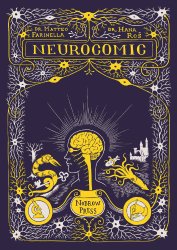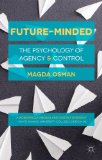April 5, 2014

Neurocomic by Hana Roš, illustrated by Matteo Farinella (Nobrow Press, 2014)
(amazon.co.uk)
Book description from the publisher:
Do you know what your brain is made of? How does memory function? What is a neuron and how does it work? For that matter what’s a comic? And in the words of Lewis Carroll’s famous caterpillar: “Who are you?”
Neurocomic is a journey through the human brain: a place of neuron forests, memory caves, and castles of deception. Along the way, you’ll encounter Boschean beasts, giant squid, guitar-playing sea slugs, and the great pioneers of neuroscience. Hana Roš and Matteo Farinella provide an insight into the most complex thing in the universe.
- Produced in association with the Wellcome Trust, one of the world’s largest medical charities
- A superb introduction to the complexities of the brain for the layman
- High production values, FSC paper stock, and foil embossed cover
See also: Book website, post at brainpickings.org (ht!)
Comments (0)
- cognitive science,new books
April 1, 2014

Seven Modes of Uncertainty by C. Namwali Serpell (Harvard University Press, 2014)
(amazon.co.uk)
Book description from the publisher:
Literature is rife with uncertainty. Literature is good for us. These two ideas about reading literature are often taken for granted. But what is the relationship between literature’s capacity to unsettle, perplex, and bewilder us, and literature’s ethical value? To revive this question, C. Namwali Serpell proposes a return to William Empson’s groundbreaking work, Seven Types of Ambiguity (1930), which contends that literary uncertainty is crucial to ethics because it pushes us beyond the limits of our own experience.
Taking as case studies experimental novels by Thomas Pynchon, Toni Morrison, Bret Easton Ellis, Ian McEwan, Elliot Perlman, Tom McCarthy, and Jonathan Safran Foer, Serpell suggests that literary uncertainty emerges from the reader’s shifting responses to structures of conflicting information. A number of these novels employ a structure of mutual exclusion, which presents opposed explanations for the same events. Some use a structure of multiplicity, which presents different perspectives regarding events or characters. The structure of repetition in other texts destabilizes the continuity of events and frustrates our ability to follow the story.
To explain how these structures produce uncertainty, Serpell borrows from cognitive psychology the concept of affordance, which describes an object’s or environment’s potential uses. Moving through these narrative structures affords various ongoing modes of uncertainty, which in turn afford ethical experiences both positive and negative. At the crossroads of recent critical turns to literary form, reading practices, and ethics, Seven Modes of Uncertainty offers a new phenomenology of how we read uncertainty now.
Comments (0)
- cognitive science,culture,new books,reading
March 31, 2014

Words as Social Tools: An Embodied View on Abstract Concepts by Anna M. Borghi and Ferdinand Binkofski (Springer, 2014)
(kindle ed.), (amazon.co.uk), (UK kindle ed.)
Book description from the publisher:
How are abstract concepts and words represented in the brain? That is the central question addressed by the authors of “Words as Social Tools: An Embodied View on Abstract Concepts”. First, they focus on the difficulties in defining what abstract concepts and words are, and what they mean in psycholinguistic research. Then the authors go on to describe and critically discuss the main theories on this topic with a special emphasis on the different embodied and grounded theories proposed in cognitive psychology within the last ten years, highlighting the advantages and limitations of each of these theories. The core of this Brief consists of the presentation of a new theory developed by the authors, the WAT (Words As social Tools) view, according to which both sensorimotor (such as perception, action, emotional experiences) and linguistic experiences are at the basis of abstract concepts and of abstract word representation, processing and use. This theory assigns a major role to acquisition: one of the assumptions the authors make is that the different ways in which concrete and abstract words are acquired constrain their brain representation and their use. This view will be compared with the main existing theories on abstractness, from the theory of conceptual metaphors to the theories on multiple representation. Finally, the volume illustrates recent evidence from different areas (developmental, behavioral, cross-cultural, neuropsychological and neural) which converge with and support the authors’ theory, leading to the conclusion that in order to account for representation and processing of abstract concepts and words, an extension of embodied and grounded theories is necessary.
Comments (0)
- cognitive science,language,new books
March 27, 2014

Future-Minded: The Psychology of Agency and Control by Magda Osman (Palgrave Macmillan, 2014)
(amazon.co.uk)
Book description from the publisher:
What drives us to make decisions?
Future-Minded explores the psychological processes of agency and control. If you’ve ever wondered why we think of coincidences as matters of fate rather than the result of the laws of probability, this book provides the answer. From memory and reasoning to our experiences of causality and consciousness, it unpicks the mechanisms we use on a daily basis to help us predict, plan for and attempt to control the future.
Future-Minded
* Features a wealth of real world examples to help you engage with this fast-developing area
* Provides clear analysis of psychological experiments and their findings to explain the evidence behind the theory
Thought-provoking and highly topical, Future-Minded is fascinating reading for psychology students studying cognition or consciousness, and for anyone interested in understanding how we try to determine the future.
See also: Author’s website, Sample chapter (pdf) from publisher
Comments (0)
- new books,psychology






